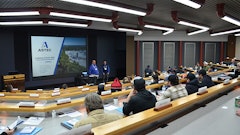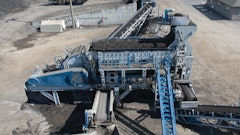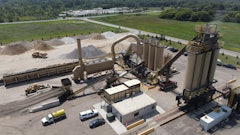The Internet has become an integral part of the American way of life. It has opened the doors to unprecedented levels of information sharing and expanded the number of business opportunities. You can buy anything from cars to used heavy equipment on line. Most large- and medium-sized corporations have created their own Intranets, which have allowed companies to operate more efficiently and cost effectively.
But when it comes to consistently making a high quality mix design, there is no way the Internet can help asphalt producers through the production process, right? Wrong! Recently developed plant control systems from Terex Roadbuilding, manufacturer of Cedarapids and CMI brand asphalt plants, controls and accessories are using the Internet and company Intranets to offer exceptional levels of remote access diagnostic capabilities of the production process.
Armed with just a computer or wireless portable laptop, a web browser and Internet connection producer superintendents, lab technicians, field workers and office personnel can access real-time plant operational information from just about anywhere to help them do their jobs more efficiently. Trend monitoring, silo storage levels, electrical outputs, mix temperatures and liquid AC and moisture content information can now be remotely accessed and reviewed without calling and diverting the attention of the plant operator.
"No longer is the control house a lone island of information for producers' asphalt plants with Quality Mix Asphalt (QMA) or Impulse control systems," says Steve Edwards, a senior project engineer with Terex Roadbuilding. Embedded web browsers — standard with QMA controls and optional as a remote terminal of the Impulse controls — allow key producer personnel to review production information to help employees anticipate material needs or solve any problems. Although these capabilities have been available to the market for the past three years, producers are just now discovering and expanding the uses of this technology.
Networking independence
Independence Construction Materials (ICM) operates five asphalt plants throughout Pennsylvania and Maryland. The lion's share of the 1.2 million tons-per-year of asphalt produced comes from a Cedarapids 500-tph drum mix plant at the company's headquarters in Devault, PA, and a second 350-tph Cedarapids plant in Aberdeen, MD.
According to Rob Schwear, superintendent for ICM's Pennsylvania plants, "Often we run the Devault plant 24 hours a day, seven days a week to make anything from highway to parking lot mixes. Sometimes we will make up to seven different mix designs in a day." With such a high demand for asphalt, complex mix schedules and a tight timeline for all of ICM's plants, the company needed a way to help make the production process more efficient.
Prior to the 2003 paving season, ICM purchased a complete QMA plant control upgrade for its Aberdeen plant. Within this upgrade, a new Modicon programmable logic controller (PLC) was installed, which included Schneider Electric's Transparent Factory Ethernet web server. A web server is embedded in every switch of the Transparent Factory, which broadcasts information that can be accessed via any web browser.
"With the QMA controls, a producer can remotely access any of the plant's 15,000 data points," claims Edwards. After experiencing benefits from networking the Aberdeen plant, ICM added this capability to the main Devault plant prior to the 2004 paving season.
Beginning implementation
Schwear admits that the new networking technology the company has is currently in "phase one" of its implementation. "We originally decided to network because the capability was already there and it didn't cost us a dime," says Schwear. However, Internet accessibility of plant component data helped to improve information flow throughout the company, from dispatch to the field to the lab to maintenance to the office.
Company personnel at both the Aberdeen and Devault plant locations have remote access to the read-only plant pages. After logging onto the company's Intranet, they can review output pages covering: the drum mixer, silos, cold feed bins, baghouse, mineral filler systems, electrical system and other plant functions.
According to Schwear, this helps all parts of the organization get a clearer picture of what is going on at the plant. Superintendents, like Schwear, can monitor the quantity of materials being used and communicate plant information to the field. Dispatch can now better stage the delivery trucks, while remote access allows field personnel to get real-time mix information to see if there have been any temperature, asphalt or aggregate gradation changes in the mix. With a wireless laptop or tablet PC, electricians can monitor the results of their repairs while working on the plant, saving time and money.
Additionally, lab personnel can review mix designs for aggregate, liquid AC and moisture content to ensure that nothing changes throughout the production process. "All this can be done without bothering the plant operator. We can let him focus on his job, making a quality mix," comments Schwear.
Beyond the production process, Ron Hamerla, plant operator for ICM, says that the remote access helps with maintaining the plant. "From just about anywhere, our maintenance guys can look at components like the aggregate feeder, the burner and the baghouse to diagnose problems. This really helps them out," says Hamerla.
ICM's Aberdeen plant is taking the networking capabilities one step further. In addition to accessing and reviewing the read-only pages, this plant has customized certain pages to permit remote programming. Aberdeen's technicians can access the plant from the lab and change the moisture content over the Internet. "Every day they access the plant from the lab and input the morning moisture numbers without going to the control house. This takes a step out of the morning ritual," says Schwear.
Since the standard broadcasted pages are read-only, security issues from accessing plant information via the Internet are minimal. The producer's Intranet fosters additional security through the use of its system's passwords and firewalls. In cases were pages are customized to allow for remote programming — similar to ICM's capabilities of inputting moisture content information — these individual pages are password protected to eliminate the possibility of inadvertent changes.
Future trends
Edwards sees the growth and evolution of plant networking being driven by the producers, as does Terex Roadbuilding Manager of Computer Controls Ken Cosby. "The technology is so new that producers are focusing more on making the mix and companies are using only about 10 percent of the networking capabilities. However, as companies discover more ways it will help them operate more efficiently and profitably, the use of plant networking will expand rapidly," comments Cosby.
He points out that with its logging capabilities, networking plants via the Internet is an excellent QC/QA tool. Producers can open up windows on their computers and trend critical mix quality items like asphalt percentages, mix temperatures, virgin aggregate, RAP gradations and material flow rates. With networked plants, this can be done without contacting the plant operator.
In the case of plants like ICM's Devault location, which sometimes operates 24 hours a day, 7 days a week, remote access trending can be developed to keep the plant running. "When the plant is operated non-stop, downtime, however minimal, is very costly to a producer," explains Edwards.
With the trending capabilities found in Terex Roadbuilding's QMA and Impulse controls, producers can monitor critical plant components like the burners, drum mixers, baghouses and silos to help create a maintenance plan that maximizes plant uptime. Workers can monitor "red flag" areas that may signal future problems areas and fix them before they create a downtime event.
If an unexpected service issue does occur, maintenance personnel can grab a computer, access specific plant pages via the Internet and diagnose the problem. "The system allows maintenance to look at input/output cards and analyze the raw data in order to get at the heart of the problem," says Edwards.
Even though ICM is only in "phase one" of its plant networking plans, Schwear already sees paybacks through improved communication to the field and greater access to the plant for lab and maintenance personnel. This helps not only to increase the company's efficiency but also to improve the quality of its mix, since all of this can be accomplished without calling the plant operator and diverting his attention.
"The more constraints taken out of the tower, the more the operator can focus on making a quality mix. If you don't make a quality mix, you don't get paid. And that's what it is all about," states Schwear.
Mark Spicer has served as vice president of sales for the Terex Roadbuilding Plant Division since July 2003. He joined the former CMI Corporation in 1993 as a district sales manager and was promoted to regional sales manager with CMI/Terex in 2002.
Interchangeable components
When ICM is in the market for a new plant or plant component upgrades for its two existing Cedarapids drum mix asphalt plants, equipment options available to the company have been greatly expanded. ICM's existing QMA software will not only operate Cedarapids brand of Magnum counter-flow drum mixers, silos and baghouses, the controls will also accommodate the CMI brand of Triple-Drum mixers and plant equipment. So producers are no longer relegated to selecting only one brand of asphalt plant equipment, they can mix-and-match components and control systems from either brand.
In 1999, Terex Corporation entered the HMA plant manufacturing business with its acquisition of Cedarapids/Standard Havens. In 2001, Terex expanded its market share by acquiring CMI Corporation. Within a year, the parent corporation announced plans to consolidate all HMA plant manufacturing functions at its Terex Roadbuilding facility in Oklahoma City.
By combining the two product lines, Terex Roadbuilding has effectively doubled the number of options available to our asphalt producing customers, allowing them to pick the best component that matches their need. In order to accomplish this, both the Cedarapids QMA and CMI Impulse control systems had to be reconfigured in order to operate components from either brand of production plants.
Later this year, Terex Roadbuilding will introduce a new drum mix plant design geared towards asphalt producers who are always on the move.















